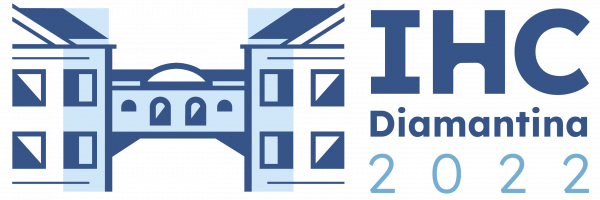Accepted work
WORKSHOP ON INTERACTIONS WITH DATA EXPERIENCES (WIDE)
Luciana Brito (UFRJ), Juliana França (UFRJ), Luiz Morais (Inria), Caroline Queiroz (UFJVM), Angélica Dias (UFRJ), Adriana S Vivacqua (UFRJ)
Call for Workshops
Researchers and practitioners are invited to submit proposals for workshops to be held in conjunction with the Brazilian Symposium on Human Factors in Computer Systems (IHC 2022). The purpose of the workshops is to provide a forum for exchanging opinions, presenting ideas, and discussing preliminary results in an interactive atmosphere.
Proposals (maximum 4 pages) should include:
- Workshop name and a 150- to 200-word abstract describing the workshop, according to the Topics of interest presented on the Symposium Web site;
- A short summary of the topic, scope, and significance of the workshop including a discussion on the relevance to IHC 2019 topics (please, include information about previous sessions of the workshop, if any);
- Information about the procedure for selecting papers/participants, plans for dissemination (for example, special issues of journals, or position statements distributed to the participants), the expected number of participants, and the planned workshop format;
- A brief CV of each of the organizers, including contact addresses and identification of a single primary contact;
- A proposal for the workshop submission, acceptance notification, and camera-ready deadlines.
Please, pay attention to the deadline for Workshop acceptance notification (see below) Therefore, the deadlines for the submission of articles should be after this date and the notification of acceptance of articles for the workshop should be sent at least one week before the registration date (first date with discount), to be defined by the Symposium Committee.
All the proposals will be judged on their merits, and the best ones will be accepted. Notice that workshops held in previous editions of the Brazilian Symposium on Human Factors in Computer Systems (IHC) will undergo the same selection process. Success on previous events (in terms of attendance, number of submissions, etc.) and the potential interest for the current edition will be taken into account in our deliberations.
Responsibilities
The organizers of IHC 2022 will provide:
- Page hosted (or link) on IHC 2022 Web site;
- Management of registration for participants;
- Setup of meeting space and related equipment;
- Coffee-breaks.
The proponents are responsible for organizing and carrying out the workshop belong. The workshop organizers must:
- Coordinate deadlines and acceptance notifications for workshop papers with the IHC 2022 Workshop Chairs;
- Publicize the workshop, its call for papers, submission and review process, and make any contact with authors;
- Provide a brief description of the workshop for the IHC 2022 Web page;
- Schedule workshop activities in collaboration with the IHC 2022 local organizers;
- At least 1 of the workshop proponents must register for IHC 2022, which will take place in person this year. A day pass is provided for those who wish to register only on the day of the workshop.
Submissions
Authors must submit their submissions electronically in PDF format through the JEMS system. We recommend using Overleaf’s Latex template. If you prefer, you can work directly with Latex source files. Optionally, you can use the MS-Word template.
Reviewers
Workshop proposals will be reviewed by at least 2 researchers from the IHC community. In case of indecision, the co-chairs will carry out a new review.
Coordination
Juliana Jansen Ferreira (IBM Research) – jjansen@br.ibm.com
Carla Lopes Rodriguez (UFABC) – c.rodriguez@ufabc.edu.br
Important dates
Submission deadline for abstracts: June 16, 2022 was May 23, 2022
Notification of results: June 30, 2022 was June 16, 2022
Submission of camera-ready: July 08, 2022 was June 24, 2022
Workshop: October 17, 2022

